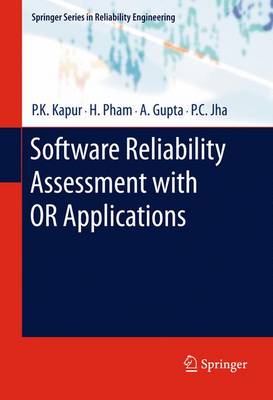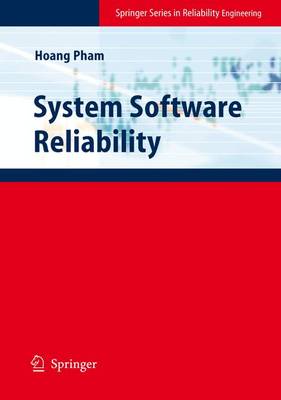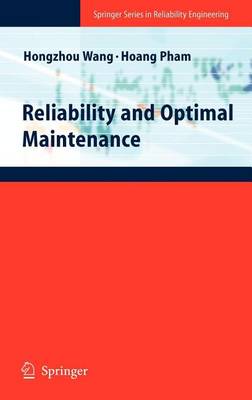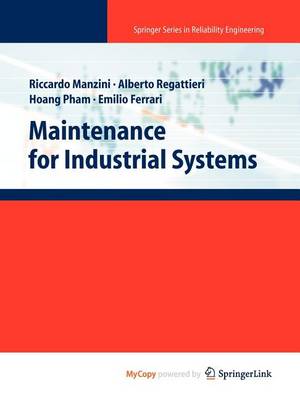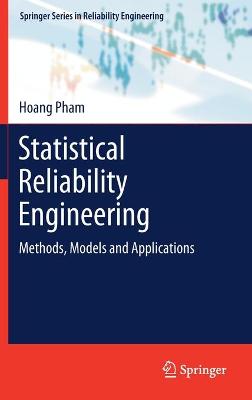Springer Series in Reliability Engineering
5 total works
Software Reliability Assessment with OR Applications
by P. K. Kapur, Hoang Pham, A. Gupta, and P.C. Jha
Software Reliability Assessment with OR Applications is a comprehensive guide to software reliability measurement, prediction, and control. It provides a thorough understanding of the field and gives solutions to the decision-making problems that concern software developers, engineers, practitioners, scientists, and researchers. Using operations research techniques, readers will learn how to solve problems under constraints such as cost, budget and schedules to achieve the highest possible quality level.
Software Reliability Assessment with OR Applications is a comprehensive text on software engineering and applied statistics, state-of-the art software reliability modeling, techniques and methods for reliability assessment, and related optimization problems. It addresses various topics, including:
- unification methodologies in software reliability assessment;
- application of neural networks to software reliability assessment;
- software reliability growth modeling using stochastic differential equations;
- software release time and resource allocation problems; and
- optimum component selection and reliability analysis for fault tolerant systems.
Software Reliability Assessment with OR Applications is designed to cater to the needs of software engineering practitioners, developers, security or risk managers, and statisticians. It can also be used as a textbook for advanced undergraduate or postgraduate courses in software reliability, industrial engineering, and operations research and management.
Computer software reliability has never been so important. Computers are used in areas as diverse as air traffic control, nuclear reactors, real-time military, industrial process control, security system control, biometric scan-systems, automotive, mechanical and safety control, and hospital patient monitoring systems. Many of these applications require critical functionality as software applications increase in size and complexity. This book is an introduction to software reliability engineering and a survey of the state-of-the-art techniques, methodologies and tools used to assess the reliability of software and combined software-hardware systems. Current research results are reported and future directions are signposted. This text will interest: graduate students as a course textbook introducing reliability engineering software; reliability engineers as a broad, up-to-date survey of the field; and researchers and lecturers in universities and research institutions as a one-volume reference.
Based on the authors' research, Reliability and Optimal Maintenance presents the latest theories and methods of reliability and maintenance with an emphasis on multi-component systems, while also considering current hot topics in reliability and maintenance including: imperfect repair, economic dependence and opportunistic maintenance, and correlated failure and repair. Software reliability and maintenance cost, and warranty cost considerations are also considered.
Maintenance for Industrial Systems
by Riccardo Manzini, Alberto Regattieri, and Hoang Pham
New, global and extended markets are forcing companies to process and manage increasingly differentiated products with shorter life cycles, low volumes and reduced customer delivery times. In today's global marketplace production systems need to be able to deliver products on time, maintain market credibility and introduce new products and services faster than competitors. As a result, a new production paradigm of a production system has been developed and a supporting management decision-making approach simultaneously incorporating design, management, and control of the production system is necessary so that this challenge can be effectively and efficiency met.
"Maintenance Engineering and its Applications in Production Systems" meets this need by introducing an original and integrated idea of maintenance: maintenance for productivity. The volume starts with the introduction and discussion of a new conceptual framework based on productivity, quality, and safety supported by maintenance. Subsequent chapters illustrate the most relevant models and methods to plan, organise, implement and control the whole maintenance process (reliability evaluation models and prediction, maintenance strategies and policies, spare parts management, computer maintenance management software - CMMS, and total productive maintenance - TPM, etc.). Several examples of problems supported by solutions, and real applications to help and test the reader's comprehension are included.
"Maintenance Engineering and its Applications in Production Systems" will certainly be valuable to engineering students, doctoral and post-doctoral students and also to maintenance practitioners, as well as managers of industrial and service companies.
This book presents the state-of-the-art methodology and detailed analytical models and methods used to assess the reliability of complex systems and related applications in statistical reliability engineering. It is a textbook based mainly on the author's recent research and publications as well as experience of over 30 years in this field.
The book covers a wide range of methods and models in reliability, and their applications, including:
- statistical methods and model selection for machine learning;
- models for maintenance and software reliability;
- statistical reliability estimation of complex systems; and
- statistical reliability analysis of k out of n systems, standby systems and repairable systems.
Offering numerous examples and solved problems within each chapter, this comprehensive text provides an introduction to reliability engineering graduate students, a reference for data scientists and reliability engineers, and a thorough guide for researchers and instructors in the field.
